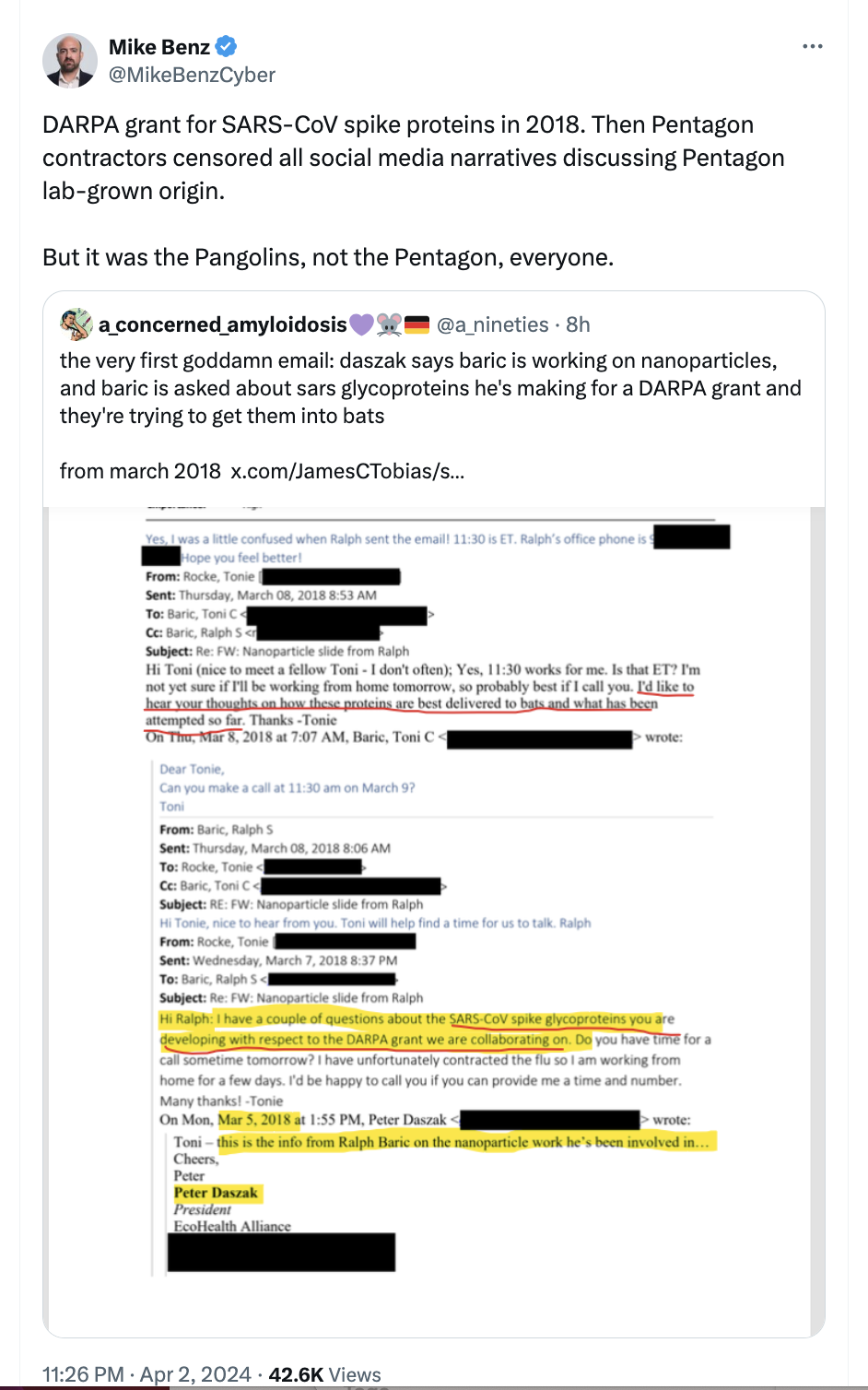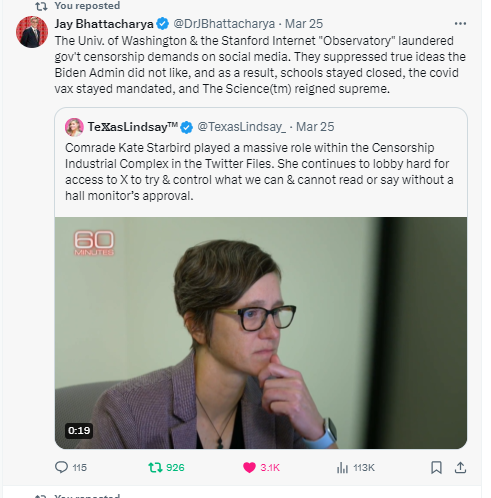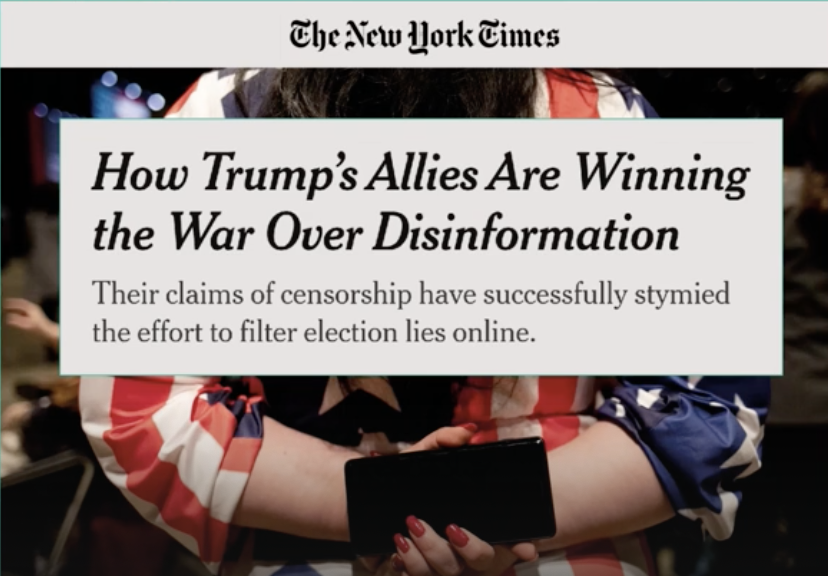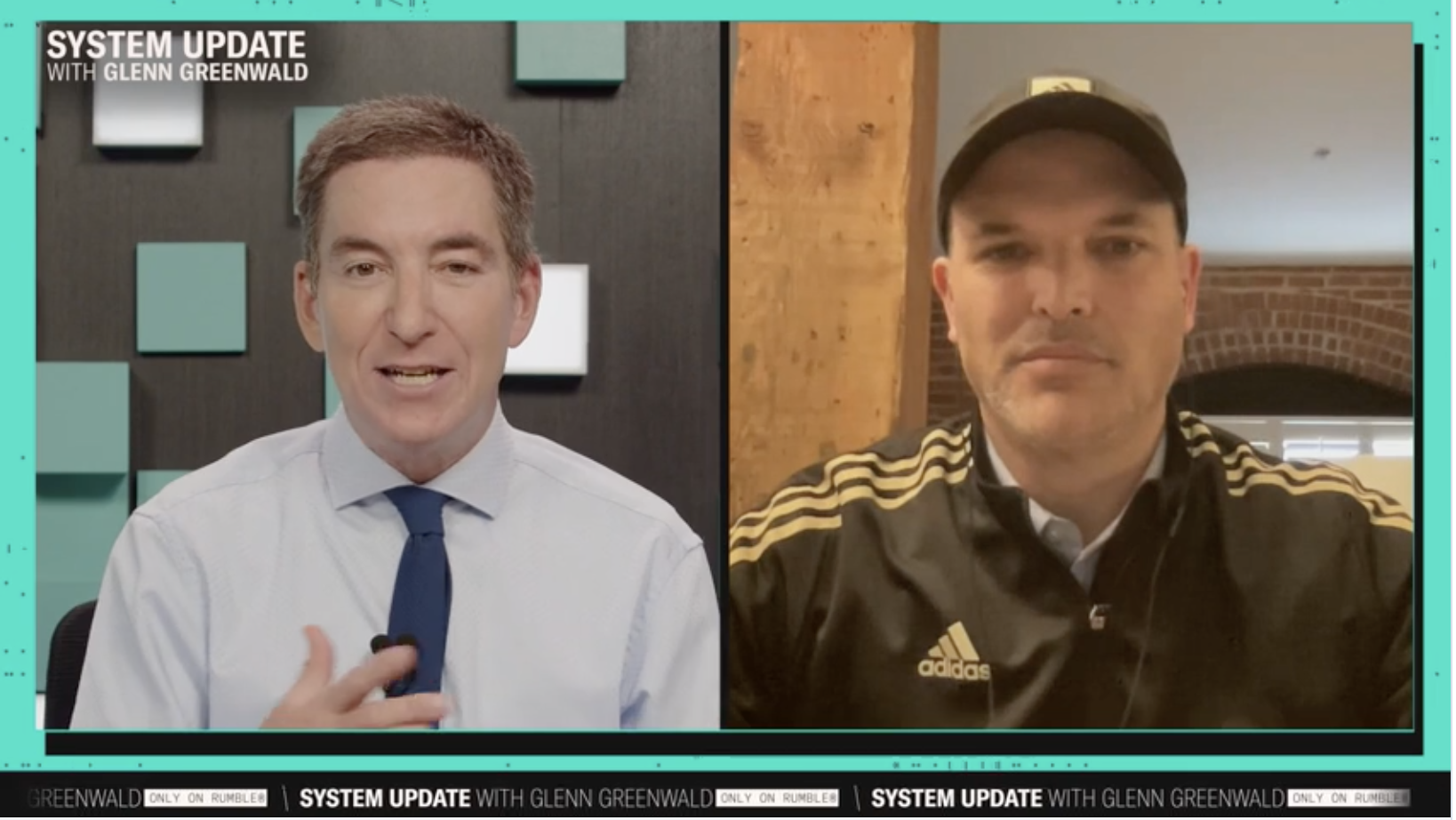One of the Many Faces of Censorship
Kate Starbird is one of the many people funded by the U.S. government to protect you from being exposed to facts and narratives that are disliked by the U.S. government.
How Corporate Media is Trying to Turn Free Speech into a “Right Wing” Position
Mike Benz Recommends How to Be Arrested
I don't know who this is, but this gentleman exhibits incredible composure while being arrested:
The above tweet was posted by Mike Benz, who has become a hero to me based upon his encyclopedic coverage of the military-censorship-industrial complex. Mike, a former State Department official, is the Executive Director of the Foundation for Freedom Online. He is incredibly brave based on the monied and powerful people he is angering. If you want to know how bad things are getting for those of use who still believe in the First Amendment, watch and learn:
Probably the best place to start is this one-hour synopsis by Mike Benz that is equally brilliant and horrifying:
Here's an excerpt from the above one-hour interview (Tucker Carlson and Mike Benz):
Tucker Carlson: You're not describing democracy. You're describing a country in which democracy is impossible.
Mike Benz: What I'm essentially describing is military rule. I mean, what's happened with the rise of the censorship industry is a total inversion of the idea of democracy itself. You know, democracy sort of draws its legitimacy from the idea that it is ruled by consent of the people being ruled that is, it's not really being ruled by an overlord, because the government is actually just our will expressed by our consent with who we vote for. The whole push after the 2016 election and after Brexit, and after a couple of other, you know, social media-run elections that went the wrong way from what the State Department wanted, like the 2016 Philippines Election, was to completely invert everything that we described as being the underpinnings of a democratic society in order to deal with the threat of free speech on the internet. And what they essentially said is, we need to redefine democracy from being about the will of the voters to being about the sanctity of democratic institutions. And who are the the democratic institutions? Oh, it's us. You know, it's the military. It's NATO. It's the IMF and the World Bank. It's the mainstream media. It is the NGOs and oh of course, these NGOs are largely state department funded, or IC funded. It's essentially all of the elite establishments that were under threat from the rise of domestic populism that declared their own consensus to be the new definition of democracy. Because if you define democracy as being the strength of democratic institutions rather than a focus on the will of the voters, then what you're left with is essentially, democracy is just the consensus building architecture within the within the democratic institutions themselves.
[More . . . ]
A Review of Some of the Amicus Briefs Filed in the U.S. Supreme Court Case of Murthy v Missouri
Murthy v Missouri will be argued on March 18. This is one of the most important First Amendment cases in this history of the U.S. Supreme Court, yet A) the NYT and most other big corporate news outlets will not discuss it and B) the ACLU refuses to get involved.
On his Substack, Aaron Kheriaty, M.D., discussed some of the amicus briefs filed in a nationally important in which he is a plaintiff, Murthy v Missouri (called Missouri v Biden in lower courts).
How important is this case? Here is an excerpt from the opinion of the Fifth Circuit Court of Appeals:
We find that the White House, acting in concert with the Surgeon General’s office, likely (1) coerced the platforms to make their moderation decisions by way of intimidating messages and threats of adverse consequences, and (2) significantly encouraged the platforms’ decisions by commandeering their decision-making processes, both in violation of the First Amendment...Generally speaking, officials from the White House and the Surgeon General’s office had extensive, organized communications with platforms. They met regularly, traded information and reports, and worked together on a wide range of efforts. That working relationship was, at times, sweeping. Still, those facts alone likely are not problematic from a First-Amendment perspective. But, the relationship between the officials and the platforms went beyond that. In their communications with the platforms, the officials went beyond advocating for policies ... or making no-strings-attached requests to moderate content ...Their interaction was “something more.”
We start with coercion. On multiple occasions, the officials coerced the platforms into direct action via urgent, uncompromising demands to moderate content. Privately, the officials were not shy in their requests they asked the platforms to remove posts “ASAP” and accounts “immediately,” and to “slow[]down” or “demote[]” content. In doing so, the officials were persistent and angry. Cf. Bantam Books, 372 U.S. at 62–63. When the platforms did not comply, officials followed up by asking why posts were “still up,” stating (1) “how does something like [this] happen,” (2) “what good is” flagging if it did not result in content moderation, (3) “I don’t know why you guys can’t figure this out,” and (4) “you are hiding the ball,” while demanding “assurances” that posts were being taken down. And, more importantly, the officials threatened—both expressly and implicitly—to retaliate against inaction. Officials threw out the prospect of legal reforms and enforcement actions while subtly insinuating it would be in the platforms’ best interests to comply. As one official put it, “removing bad information” is “one of the easy, low-bar things you guys [can] do to make people like me”—that is, White House officials—“think you’re taking action.”
That alone may be enough for us to find coercion. Like in Bantam Books, the officials here set about to force the platforms to remove metaphorical books from their shelves. It is uncontested that, between the White House and the Surgeon General’s office, government officials asked the platforms to remove undesirable posts and users from their platforms, sent follow-up messages of condemnation when they did not, and publicly called on the platforms to act. When the officials’ demands were not met, the platforms received promises of legal regime changes, enforcement actions, and other unspoken threats. That was likely coercive...
We also find that the FBI likely significantly encouraged the platforms to moderate content by entangling themselves in the platforms’ decision making processes.... Beyond taking down posts, the platforms also changed their terms of service in concert with recommendations from the FBI. For example, several platforms “adjusted” their moderation policies to capture “hack-and-leak” content after the FBI asked them to do so (and followed up on that request). Consequently, when the platforms subsequently moderated content that violated their newly modified terms of service (e.g., the results of hack-and-leaks), they did not do so via independent standards.... Instead, those decisions were made subject to commandeered moderation policies. In short, when the platforms acted, they did so in response to the FBI’s inherent authority and based on internal policies influenced by FBI officials. Taking those facts together, we find the platforms’ decisions were significantly encouraged and coerced by the FBI...
[T]he Supreme Court has rarely been faced with a coordinated campaign of this magnitude orchestrated by federal officials that jeopardized a fundamental aspect of American life. Therefore, the district court was correct in its assessment—“unrelenting pressure” from certain government officials likely “had the intended result of suppressing millions of protected free speech postings by American citizens.”
State v. Biden, 80 F.4th 641, 653 (5th Cir.), opinion withdrawn and superseded on reh'g, 83 F.4th 350 (5th Cir. 2023), cert. granted sub nom. Murthy v. Missouri, 144 S. Ct. 7 (2023).
Based on Kheriaty's summaries of the amicus briefs, it's surreal to see how many formerly admirable institutions have become throughly corrupted by money (often government money) and power to represent the joint position of the U.S. Government and mega-corporations. This is what you might expect with so many entities receiving government largess to do the government's dirty work. This includes the ACLU, as Kheriaty comments:
Not long ago, the ACLU would have championed the plaintiffs in Missouri v. Biden. The organization was founded in 1920 in response to the Wilson administration criminalization of dissent regarding World War I. After the jailings of journalists, pamphleteers, and presidential candidate Eugene Debs, the ACLU immediately began defending anti-war activists’ First Amendment freedoms.
The ACLU famously defended neo-Nazis’ right to march through a Jewish suburb, but the organization later became an arm of the Democratic Party, shedding its former principles in the process.
The group has no shortage of amici briefs and opinions on their website; they’ve petitioned courts to support gun control, abortion, Covid vaccine mandates, and race-based university admissions and to oppose bans on men in women’s sports and efforts to curb illegal immigration. Despite this flurry of opinions and news releases, the ACLU has not made a single mention of Murthy v. Missouri (or Missouri v. Biden) on its website.
While the politicization of the ACLU has been well-documented over the last decade, it remains remarkable that the country’s most prominent civil liberties organization has decided not to support plaintiffs in what may amount to the most consequential First Amendment case of the last half-century.
This case is coming up for oral argument on March 18.
You wouldn't know much about this based on the silence of corporate media. Kheriaty mentions this:
While news outlets like the New York Times have largely ignored the case and others like CNN have insisted that “it is far from clear that the administration’s conduct amounted to censorship,” the Wall Street Journal has dutifully covered the legal proceedings and taken an editorial stand against the White House’s attacks on free expression.
For a detailed and principled view of Murthy and the First Amendment, consider this amicus brief filed by the Foundation for Individual Rights and Expression.
- Go to the previous page
- 1
- 2
- 3
- 4
- 5
- 6
- 7
- 8
- …
- 20
- Go to the next page








